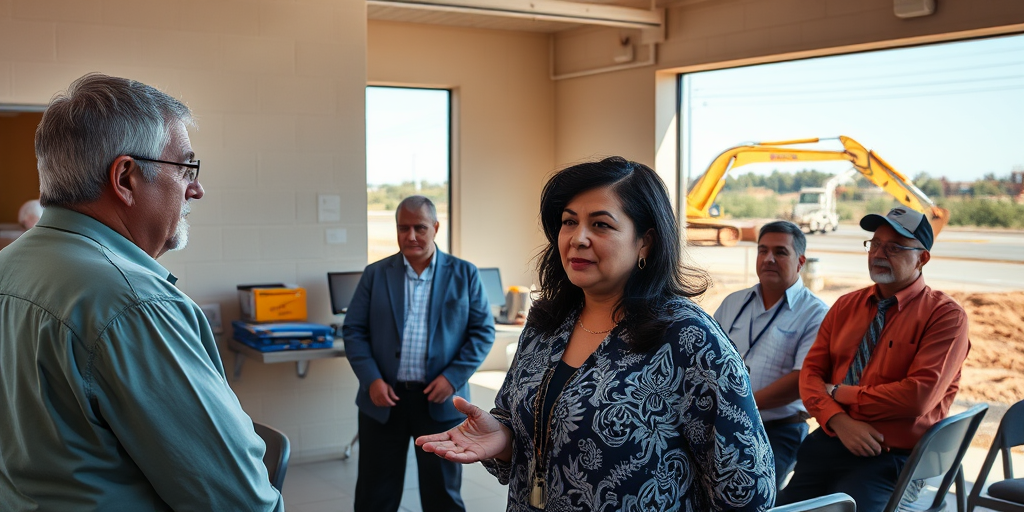Lopez Leads Infrastructure Workshops to Address Water Challenges in the Rio Grande Valley
State Representative Janie Lopez is championing a proactive approach to addressing pressing water infrastructure challenges in the Rio Grande Valley (RGV) through a series of educational workshops. Following the 89th Texas Legislative Session, Lopez initiated these workshops, held in collaboration with the Texas Water Development Board (TWDB), to tackle issues crucial for the sustainable development of South Texas’ communities.
Regional Workshops: An Overview
The workshops aim to enhance the understanding of water needs by dissecting population projections, water quality assessments, and leveraging advanced mapping technologies. These initiatives are essential as they pave the way for long-term regional planning across Texas, specifically focusing on 50-year strategies designed to manage drought, demand, and flood mitigation effectively.
State Representative Lopez, a San Benito native, underscored the strategic importance of these workshops for the RGV. “These workshops aren’t just about identifying problems; they’re about equipping Valley residents with the knowledge and resources to implement real, lasting solutions. This initiative highlights the power of informed local leadership in securing our water future,” said Lopez.
Financing Water Infrastructure: Bringing in Funds
A pivotal theme in these workshops is financing water infrastructure projects. Attendees were informed about grants and low-interest loans available that do not require local matches, which can significantly bolster infrastructure improvements. Lopez reiterated her dedication to securing funding that directly benefits her constituency. In the previous session, she successfully secured over $47 million in funding for Brownsville, with additional support for rural and coastal regions.
Senate Bill 7, co-authored by Lopez and supported during the 89th session, significantly impacts these efforts. This legislation allocates over $1 billion to statewide water projects, with a similar amount expected in future sessions, pending voter approval this November. “These funds are critical for ensuring our communities have access to clean drinking water, effective drainage systems, and updated infrastructure capable of withstanding our extreme weather conditions,” Lopez asserted.
Local Impact: Aiming for Sustainable Solutions
The workshops represent a significant step toward empowering local communities in the RGV. They focus on educating municipal leaders on navigating and accessing available resources for essential water infrastructure. This endeavor directly addresses the valley’s dual challenges of drought conditions and flooding, recurring issues that demand robust solutions.
The initiatives have been met with optimism by local leaders and residents. Pedro Martinez, a community leader from Cameron County, praised the workshops’ focus. “Information is power; empowering our community leaders with this knowledge allows us to better protect the valley’s water supplies and anticipate future needs,” he stated.
Strategic Alignment with Texas’s Broader Water Goals
The efforts in the RGV align with Texas’s broader water region goals, each tasked with designing comprehensive 50-year plans. These plans anticipate future conditions, ensuring that water demands are met, and environmental challenges like flooding are mitigated.
State Senator Charles Perry, an ally in these initiatives, supports this alignment, recognizing the critical role such forward-thinking plays in statewide resilience. “By focusing on long-term solutions, the work being done is not just for today’s needs but paves the way for sustainable development that future generations can depend on,” Perry remarked.
Implications and Moving Forward
With Senate Bill 7 pending voter approval for future funding phases, the workshops provide essential groundwork for widespread community support. The implications for the RGV are vast—should funding be secured, the region can anticipate significant infrastructure upgrades benefiting not just municipal water supplies but also agricultural sectors vital to South Texas’s economy.
The integration of advanced mapping and quality assessments also means more informed decisions can be made at local governance levels, offering a more strategic path forward for community leaders.
As the workshops continue to roll out, Representative Lopez encourages local officials and residents to engage actively and explore the upcoming opportunities. She acknowledges the concerted efforts of state leaders and local officials, emphasizing that continued collaboration is key.
For more details on upcoming workshops or funding opportunities, community members are urged to contact Representative Lopez’s district office at (956) 742-6177.
With these concerted efforts, the future of water infrastructure in the Rio Grande Valley is poised for transformation, securing resources pivotal to the well-being of Valley residents and South Texas as a whole.







